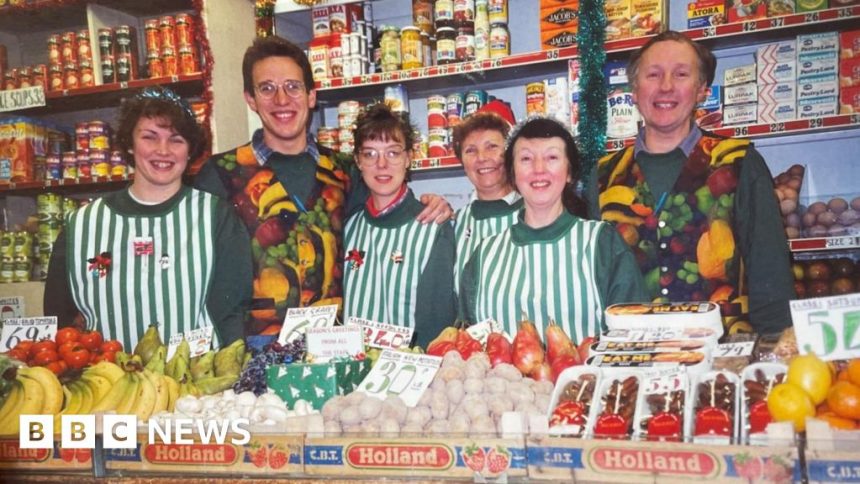The family shop saying goodbye after 64 years
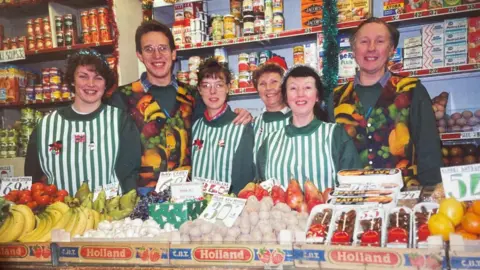 Supplied
SuppliedAlan Hartley was never supposed to open a fruit and veg shop.
A career in engineering was on the cards for the-then 19-year-old, but Alan’s eyes and heart were set on running his own mobile store.
He spoke to mum Janet and dad Albert and had a chat with the council about his options.
In November 1960, while still a teenager, he took control of an empty unit at what would become known as the Gaunt Shopping Centre – it wasn’t on wheels, but it was his.
On Friday, 64 years later, Alan pulled down the shutter for the final time on local retail institution AE Hartley & Son.
When we meet him, Alan, now 83, surveys the scene around the shop, including new buildings and the empty neighbouring stores in which the tills went quiet a long time ago.
“We’d be looking at a field now,” he says, gazing across the concrete precinct.
“Not a big brick wall at the back of a chemist. The view was definitely better then.”
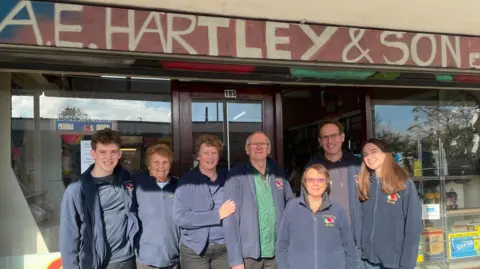 Simon Thake/BBC
Simon Thake/BBCThree generations of the Hartley family, wearing the matching blue fleeces introduced by the business 15 years ago, are stood inside the shop.
They are happily reminiscing about the memories that have been created over butter, potatoes, toothpaste and toilet cleaner during the years they have worked there.
A steady stream of customers comes through the door to offer well wishes. Some leave cards. Many are emotional.
“We’ve had tears from several customers. I’m saving mine for a bit,” says Janet, Alan’s 89-year-old sister who has been at his side since the start.
She left a job in insurance, deciding that working with family in the shop suited her better.
“We’re a big family. That’s our strength. When it’s backs to the wall. We present a united front,” she adds.
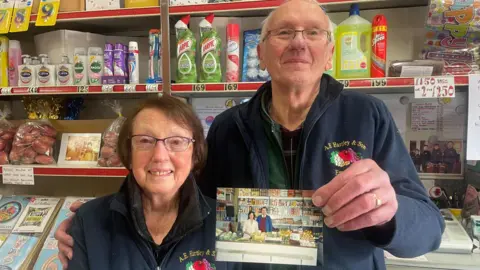 Simon Thake/BBC
Simon Thake/BBCFor the first few years the shop, named after Alan’s father Albert Edward Hartley, simply sold fruit and veg.
Fresh produce was lined up and displayed in boxes outside the front of the store on a well-swept pavement in the Gleadless area, about three miles south east of Sheffield city centre.
Potatoes would arrive in huge wooden crates and have to be lugged up from the cellar.
Alan’s eldest son Lee, now 51, remembers watching on a child as his father and grandfather struggled with the “back-breaking work” of moving huge quantities of potatoes around.
“In the early 60s people weren’t eating rice and pasta so we sold tonnes and tonnes of spuds.
“After a couple of years Dad realised the heavy lifting would kill him so he invested in a conveyer belt,” he says.
The original 1960s conveyer belt is still in operation today.
Lee proudly fires it up to demonstrate its deafening whirl.
The family are now looking into transferring it to a local museum.
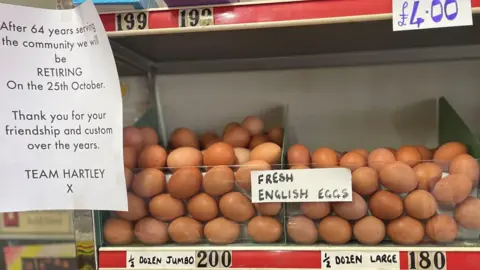 Simon Thake/BBC
Simon Thake/BBCLooking out across the shop from a stool perched behind the counter, Janet reflects on the current dwindling stock, deliberately run down before closure.
In the far corner is a tall glass-fronted fridge, it is half-empty and contains energy drinks.
“I remember when they wheeled that in.
“We didn’t know where to put it. It seemed so big,” she says.
“We used to sell old glass bottles of Tizer and Dandelion and Burdock.
“People used to have it with their Sunday dinner,” she recollects with a smile.
A chest freezer followed. It’s currently stocked with frozen pizzas and sausages.
“People purchase food differently. They just don’t shop local anymore,” she explains.
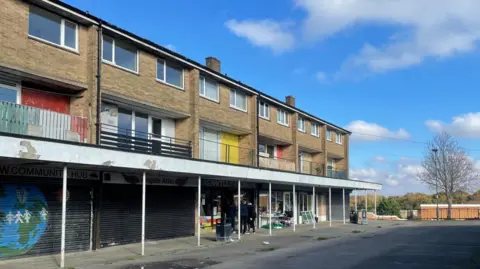 Simon Thake/BBC
Simon Thake/BBCLee ended up taking over the day-to-day running in the 1990s and despite only being in charge for a mere 30 years or so, he is clear on what has kept the business alive while others around have floundered and fallen.
“Adapt or die,” he tells me, stood near a shelf where birthday candles and soap jostle for the pre-eminent position.
“When the supermarkets became more and more popular, all the shops around us started closing; the newsagent and bakers.
“We realised that we had to diversify and start stocking those products for our customers.”
Now behind the counter where there used to be a vat of loose dirty potatoes sits a neat row of greeting cards, wrapping paper and helium balloons.
Time and the march of purchasing progress has not swept all before it in the shop just yet, though.
Eggs can still be bought individually from a huge pile behind the counter.
Customers know to return their old egg boxes to be re-used.
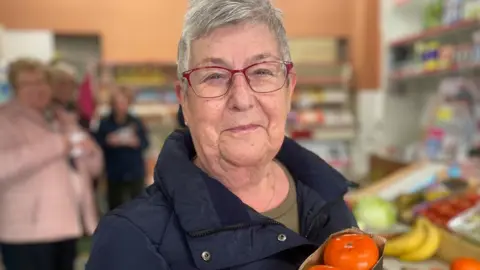 Simon Thake/BBC
Simon Thake/BBCSue Denton, 63, has been coming to the store for 40 years.
She’s brought flowers for the family and is buying some sharon fruit – something the shop didn’t stock when it opened for the first time.
“It’s near on, they sell everything. It’s like a family for me.
“I don’t know what I’m going to do now,” she says.
Mick Pearson, 68 comes in every day.
Today he’s buying a tin of corned beef.
He jokes: “I come in to be abused. I’m going to starve when they close.”
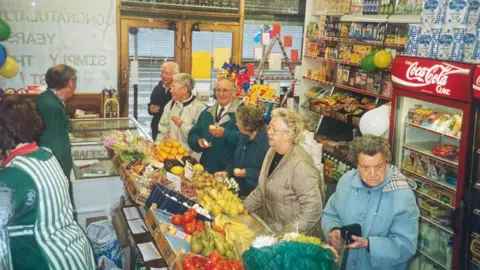 supplied
suppliedAccording to the youngest generation of the Hartley clan, Jamie, 19, and Amy ,18, the “legendary” pick-n-mix sweet boxes have also stayed the same over the years since their grandfather first opened up.
Amy, talking about a bag containing a mix of cheaper sweets, insists: “It’s the only place round here you can get a proper good mix up.”
The teenage pair tease each other about child labour and who started working at the shop first.
“Put it this way, there’s a photo of me as a baby in the sweetie weighing scales,” laughs Jamie.
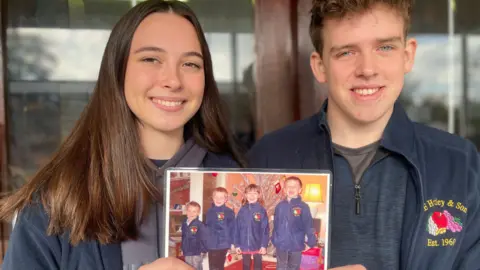 Simon Thake/BBC
Simon Thake/BBCOver the years the shop’s nostalgic vibe has also caught the attention of TV producers.
The exterior was used for the 1980s-set ITV underwear drama Brief Encounter, while in 2022 the Disney TV series of Sheffield-based The Full Monty used the store as a newsagents.
Getting ready for the shop to close for the last time, Lee, who is moving into catering and currently converting a horse box for a new coffee business, admitted it would be a very difficult day: “I’m very sad. I grew up with these people that come in, sad times are coming.”
Alan’s hands-off approach has allowed him to see more than his shop counter for the past few years.
He and wife Pat have enjoyed cruises to as far afield as Australia and China – and hope to explore further in their proper retirement.
“I’ve mixed feelings,” he said.
“I’m ready for a rest but I’ll miss the customers so much. They’re more like friends.”




